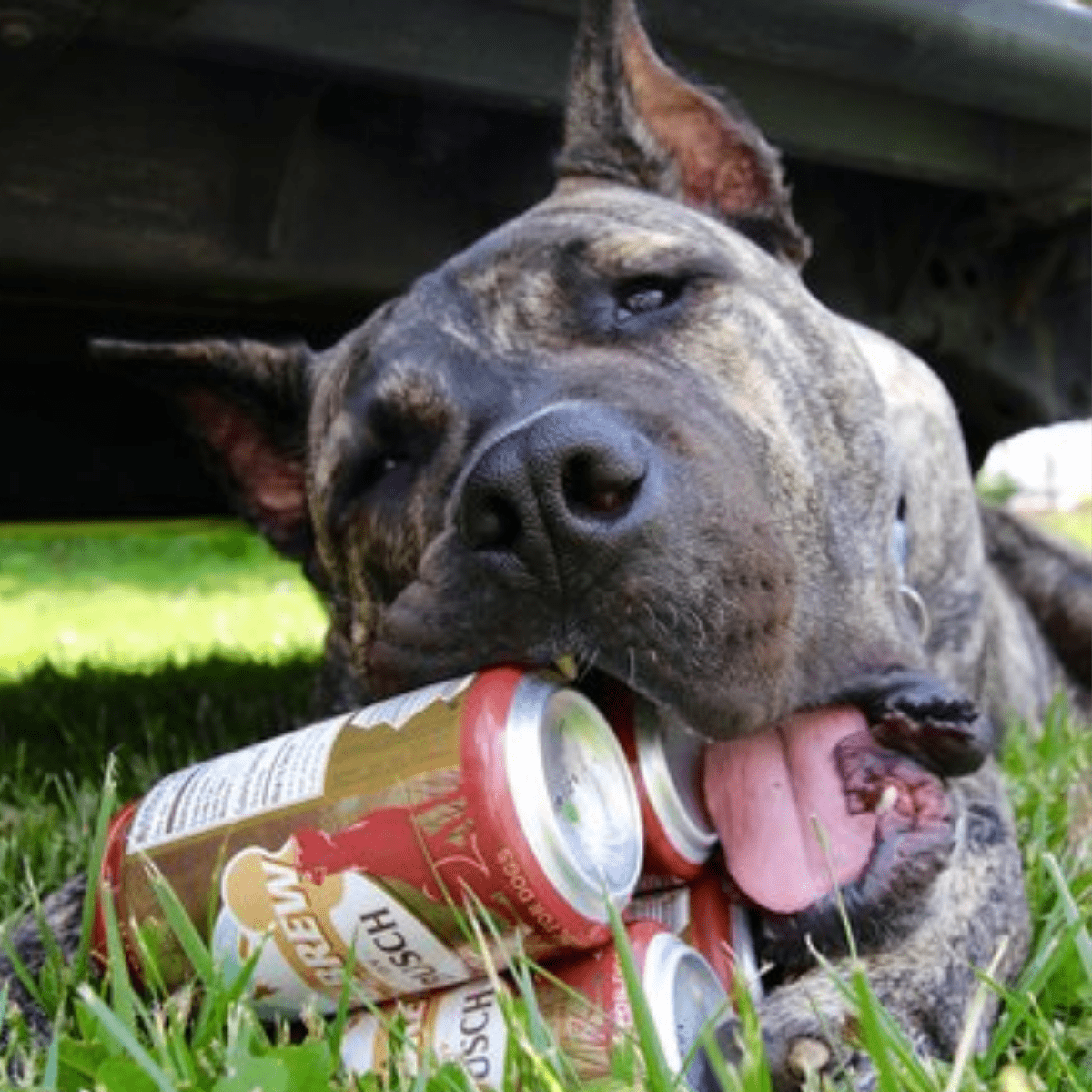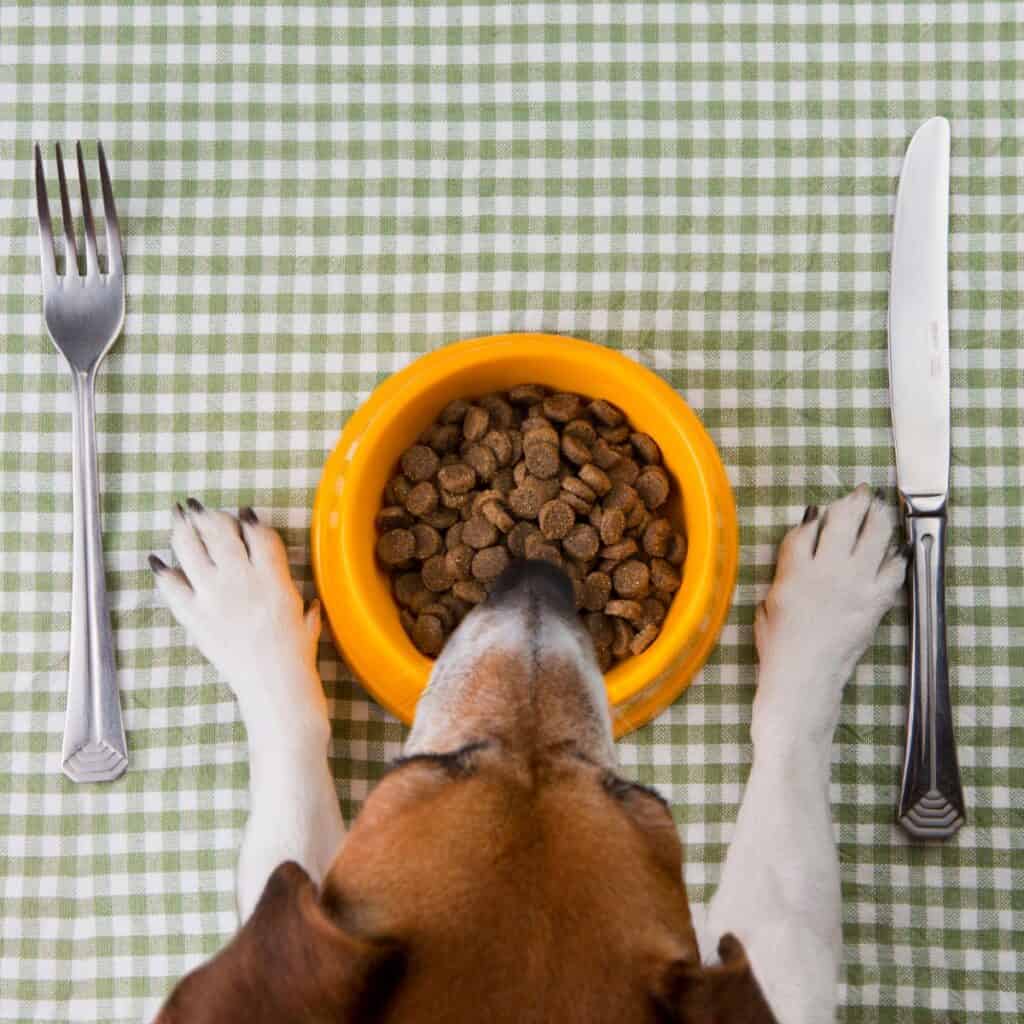Have you ever wondered if a pet food taster or dog food tester is a viable career choice for you or your pooch?

Well we were too! Read on to learn what we found about this intriguing and unusual career and any special training you need to join the ranks of those pooches or people on the career path of a professional dog food taster.

You may have heard about the Busch Dog Taste Tester that was paid $20,000 to be the Busch Dog Beer taste tester plus other gifts and bonuses.
While we would like to think that this is a viable career choice this fun competition alas does not lend itself to a long term career just ask Ethan, who likely loved his prizes, but did not go on to be a pet food tester as a real job. So, if you are thinking you can send your dog out to earn the bacon as they say – maybe not.
To tackle a career as a professional dog food taster it will be all you!
Why Pet Food Tasters Are Important
Dog food companies take taste seriously as they vie to be the top dog food in the minds of all dogs (even tastier than homemade dog food). Commercial dog food companies would love to test foods on dogs but getting the right signal that the food is superior than another can be tricky. It would be helpful to use dogs themselves to assess the latest pet food flavors since as we described in our article on Can my dog taste sour? Plus other fun dog facts about how dogs enjoy food a dog’s palate is very unique and slightly different than ours.
Dogs do care what their food tastes like but not in the same way we do with human food. Along with tastebuds for sweet, salty, sour and bitter, they have a fifth set of taste buds specific to water. Also, dogs have some specific taste receptors tuned for meats, fats and meat related products.

Alas, given the limitations of real dog taste testing dog food companies need to bring in the professional tasters to assess food quality standards, assess balance and other factors of taste that affect the sense of taste, which may not be the easiest job.
You may also be interested in our article Can Dogs Taste Sugar and Other Fun Facts About How Dogs Taste Food
Unlike a straight food critic, a professional food taster needs to use science to assess the desirability of a particular food for dogs.
What is a pet food tester?
A professional taster or pet food tester, tastes pet food to determine if it will meet the high standards of our pets. Pet food tasters determine that pet foods meet the standards of pets, as Philip Wells describes in the Guardian as to open sample tins of each freshly made batch of dog (or cat) food, smelling it and eating it. Although, Wells indicates dogs’ palates are different to ours, “taste is an important quality check to ensure each different ingredient is perfectly balanced in just the right way,”
Wells is the chief pet food taster for Lily’s Kitchen pet food. “Trying the food is also a good way to pick up on the nuances of the cooking (which of course is impossible with raw food); this works especially well on the dry kibbles” says Wells. In the end regular taste tests are the only reliable way to achieve this.
Some may consider this a disgusting job but as Wells notes, all food regulated by the FDA needs to be fit for human consumption. Just in case you were going to cross professional taster off of your career list know, that the food products that we provide to our pets is no less clean and sanitary than those we eat ourselves.
What Training Does a Pet food tester need?
Pet food testers are often scientists. The Senior Scientists position at dog food brands, like Blue Buffalo, are nutrition experts responsible for identifying innovation opportunities to“Pet-ize” human food which means developing a taste profile and likely testing it on a dog’s behalf.
Such a position requires a doctoral degree in science like a masters and/or PhD in Meat, Animal or Food Science, Meat Processing or related field, Wet pet food formulation and/or processing experience, and an Understanding of companion animal nutrition, AAFCO regulations, and pet food labeling.
There are certainly other entry level positions but any job as a pet food taster or pet food developer will require a scientific background or a background as a pet nutritionist.

In short, if you want to become a dog food tester or professional food taster you’ll most likely need an advanced degree in food science or the culinary arts. A nutrition degree can also be helpful, as well as a post in product development at a food or beverage company. It is also helpful for pet food testers to be familiar with the pet food market by performing a bit of market research, as Wells does and learning as much as possible about dog food.
See also Wondering How Much to Feed Your Dog?
Where can I work as a pet food tester?
Pet food testers can work for pet food testing companies or for pet food brands and makers of animal foods that pride themselves on creating delicious dog food.
If you are thinking this is a career for you give it a try you may want to steer clear if dog food turns your stomach but otherwise being a pet food taster can be very rewarding as you will play a role in getting our pets the healthiest tastiest choices available.

